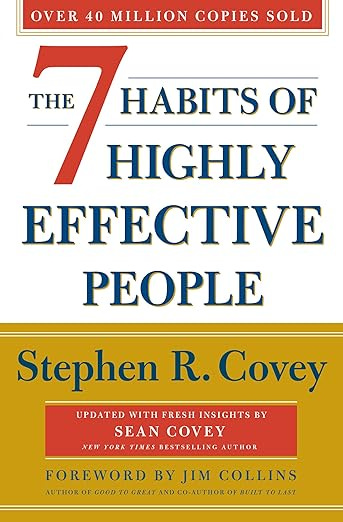The 7 Habits of Highly Effective People, a New York Times bestseller with over 25 million copies sold, remains one of the most influential business books of the 20th century. Dr. Stephen R. Covey’s timeless guide offers a principle-centered approach to problem-solving in both personal and professional settings. In this 30th-anniversary edition, Covey’s wisdom is refreshed with modern insights from his son, Sean Covey, addressing how the 7 habits can be applied in today’s world.
With life-changing lessons on self-renewal, leadership, and creativity, this book emphasizes the importance of tapping into your mental, physical, and spiritual resources to adapt to change and seize opportunities. The 7 habits—focusing on fairness, integrity, honesty, and dignity—have become essential tools for anyone seeking to live a more balanced, effective life. Whether you’re a leader, teacher, parent, or student, these habits provide a proven framework for achieving success and fulfillment.
Here are 7 key lessons from The 7 Habits of Highly Effective People:
Be Proactive: Take control of your actions and responses instead of reacting to external circumstances. Proactive people focus on what they can influence, rather than what is outside their control.
Begin with the End in Mind: Define a clear vision of what you want to achieve in life. By setting long-term goals and aligning your daily actions with those goals, you create a roadmap for success.
Put First Things First: Prioritize important tasks over urgent but less impactful ones. Effective time management allows you to focus on what truly matters, fostering both personal and professional growth.
Think Win-Win: Cultivate an abundance mindset, believing that success is not a zero-sum game. Seek mutually beneficial solutions in relationships, whether personal or professional.
Seek First to Understand, Then to Be Understood: Practice active listening and empathy before sharing your perspective. Building trust and fostering effective communication require you to truly understand others’ viewpoints.
Synergize: Leverage the strengths of others through teamwork. By working collaboratively, you can achieve far more than you could on your own, as diverse perspectives and skills lead to creative solutions.
Sharpen the Saw: Regularly renew and take care of yourself in four areas: physical, mental, emotional, and spiritual. This self-care practice ensures sustained growth and resilience in the long term.











